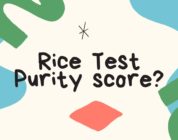Making sense of the rice purity test score meaning, from what they tell us about our experiences to how they can shape our understanding of ourselves.
You know that feeling when you’re about to open a mystery box, and your heart is pounding with excitement and curiosity? Well, that’s what we’re doing today with the Rice Purity Test. This test is a self-graded survey that assesses the participants’ participation in various activities, such as criminal behavior, deceit, and indulgence in certain vices. But what do these scores mean? Can they tell us anything about ourselves? Let’s take a deep dive into the rice purity test score meanings and find out.
Decoding the Rice Purity Test Score Meaning
Just like cracking a code, understanding the rice purity test score meanings involves a little bit of decoding. In essence, the test is designed to measure the degree of ‘innocence’ in various aspects of life. It’s all in the name: ‘purity’. But remember, this test is not a measure of your worth but merely an interesting tool to explore different aspects of life experiences.
A Lower Score: The Road Less Travelled
If you’ve scored on the lower end of the scale (0-45), it indicates that you’ve had a fair share of life’s more risqué experiences. Does this mean you’re an outlaw or a rebel? Absolutely not! It merely reflects the breadth of your experiences, suggesting you’ve likely stepped out of your comfort zone more often than not.
A Higher Score: The Path of Caution
On the other hand, a higher score (85-100) indicates fewer experiences in the more adventurous aspects of life. It could suggest a tendency towards caution, or perhaps a different set of life choices. Does that make you a stick in the mud? Nope, not at all! It simply shows that you’ve possibly followed a different path or have chosen to hold off on certain experiences.
A Score in the Middle: The Balancing Act
Lastly, if your score is somewhere in the middle (46-84), it suggests a balanced blend of experiences. You may have had your moments of adventure and thrill, but also know when to hit the brakes. Now, doesn’t that sound like the best of both worlds? It sure does!
The Scale of Scores: A Comprehensive Overview
Understanding the rice purity test score meanings involves getting a handle on the scale of scores. The test comprises 100 questions and your score is determined by the number of ‘innocent’ activities you have not engaged in.
Factors Influencing the Rice Purity Test Scores
Cultural Background
Does your cultural background play a role in your Rice Purity Test score? You bet! Your upbringing, cultural norms, and societal values can significantly impact your responses to the test.
Individual Personality
Your personality traits also have a role to play. Are you adventurous, conservative, rebellious, or shy? All these facets of your personality will reflect in your score.
Peer Influence
Another influential factor could be your circle of friends and acquaintances. The experiences you’ve shared with your peers can often be a crucial determinant of your score.
Unearthing the Psychological Aspects
One fascinating angle to the rice purity test score meaning is the psychological aspect. The test doesn’t just tell you about your experiences, it may also hint at your attitudes, risk-taking propensity, and how open or reserved you are towards trying new things.
The Social Implications of Rice Purity Test Scores
While the rice purity test score meanings can be fun and intriguing, it’s essential to understand the social implications as well. In no way should these scores be used to judge, shame, or stereotype individuals. Everyone’s experiences and choices are unique and valid, regardless of their score on the test.
Does Age Influence Rice Purity Test Scores?
Age, being a proxy for accumulated experiences, can significantly impact Rice Purity Test scores. As we age, we generally gain more experiences, which might lower our scores. But remember, it’s not about scoring high or low; it’s about acknowledging and understanding the rich tapestry of your life experiences.
Frequently Asked Questions
- What is the Rice Purity Test?
The Rice Purity Test is a self-graded survey that assesses one’s participation in various activities such as criminal behavior, deceit, and indulgence in certain vices. - What do Rice Purity Test scores mean?
The scores indicate the degree of ‘purity’ or innocence in terms of life experiences. A lower score indicates a broader range of experiences, while a higher score suggests fewer experiences in certain aspects of life. - Does a lower score mean I am a bad person?
Absolutely not! The Rice Purity Test is not a measure of your moral standing or worth. It is merely a tool to explore different aspects of life experiences. - Does a higher score mean I am naive?
No, a higher score merely indicates that you may have chosen to avoid certain experiences or situations. This doesn’t make you naive, just cautious or reserved in some aspects. - Can my Rice Purity Test score change over time?
Yes, your score can change over time as you gain new experiences and explore different facets of life. - Should I take the Rice Purity Test scores seriously?
The Rice Purity Test can be a fun and insightful exercise, but it’s important to not attach undue significance to the scores. It’s not a psychological assessment or a measure of your worth.
Conclusion
The rice purity test score meanings can indeed be an exciting labyrinth to explore. It opens up a realm of introspection and self-understanding. But remember, it’s not about getting a perfect score; it’s about learning and growing from our experiences.
In the grand scheme of things, each one of us is a unique piece of the puzzle, with our scores merely adding an extra layer of intrigue to our fascinating life stories.




